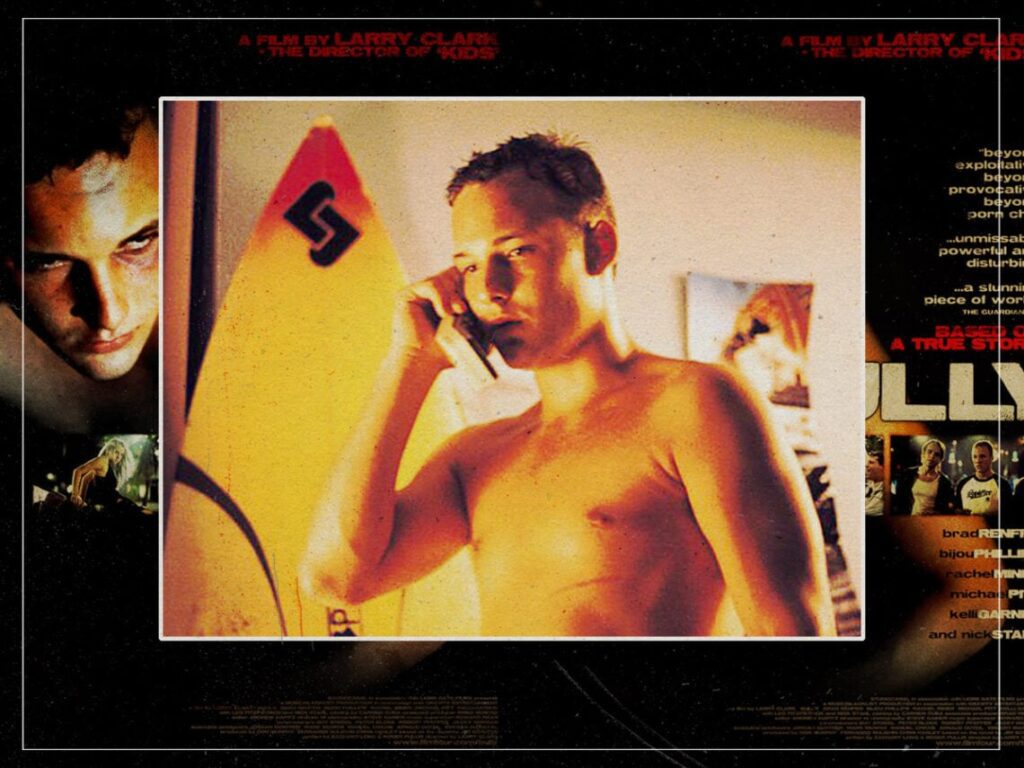‘Bully’: Larry Clark’s shocking teen exposé
 Posted On
Posted On
(Credits: Far Out / Lions Gate Films)
Teen movies come in all forms, shapes, and sizes, but very rarely have they been more harrowing, provocative, and controversial than when Larry Clark unveiled the 2001 drama Bully.
As the director of the boundary-pushing and opinion-splitting Kids, which he followed up with the equally contentious Another Day in Paradise, Clark had become both the scourge of ratings and censorship boards everywhere while gaining a reputation for telling unflinching, graphic, and sexually-conscious stories about young people to a degree that nobody else in cinema was even attempting.
It won him just as many admirers as it did detractors, though, with Bully experiencing a similarly polarising response after using a real-life incident as the backdrop to its narrative. In July 1993, 20-year-old Bobby Kent was murdered by seven of his friends in revenge for an ongoing campaign of physical, psychological, and sexual abuse and bullying he’d been carrying out against them.
The event itself was shocking, but it was never going to be treated with kid gloves on-screen once Clark signed on to direct. In fact, screenwriter David McKenna was left so disgusted with the end product that he requested his name be removed from the credits and replaced with that of pseudonym Zachary Long.
Per The Hollywood Reporter, the scribe blasted Bully for the way it “resembled a porno” with “unbelievably gratuitous sex, no story, zero motivation, no character development”. It was never going to be anything but with Clark steering the ship, even if those criticisms were echoed by many left stunned by such a serious and troubling event being depicted so voyeuristically that it bordered on exploitative.
That’s not to detract from the work of the young cast, all of whom convey the anxieties of adolescence in their roles, which ultimately leads them to the conclusion that there’s no other way to extricate themselves from the reign of terror imposed upon them by Nick Stahl’s Kent than by guaranteeing he won’t be able to hurt anybody else.
Brad Renfro’s Marty Puccio, Bijou Phillips’ Ali Willis, Kelli Garner’s Heather Swallers, Daniel Franzese’s Derek Dzvirko, Michael Pitt’s Donny Semenec, Leo Fitzpatrick’s Derek Kaufman, and Rachel Miner’s Lisa Connelly are the septet of co-conspirators, and seeing these everyday teens commit such an atrocity made Bully feel like a punch to the gut in its protracted depiction of the murder.
Of course, that was precisely the reaction Clark wanted to generate, with the filmmaker laying down a marker he more than lived up to. “I want the audience to pay for all those fucking stupid movies they watch, where hundreds of people get killed,” he said. “People have seen the film and said, ‘It’s so violent’. But there’s only one killing. You go to other movies and there are a hundred killings, but they mean nothing.”
It does admittedly feature an awful lot of sexuality, sordid developments, and extended gazes towards glistening bodies across its 114-minute running time, but it’s not a stretch to interpret Bully at large as being an examination on the increasingly early loss of innocence experienced by modern teenagers, which in this instance culminates in the crossing of a line they can never come back from.
Sex and violence have always gone hand-in-hand with tragedy, and it’s the overbearing shadow of Kent that looms large over almost every instance in the film. It’s not an easy watch, and it’s certainly not a movie that everyone will enjoy, but Bully nonetheless retains its power more than 20 years on as a snapshot of how circumstances can force even the youngest generations to take drastic measures to find freedom of some semblance at any cost.
[embedded content]


